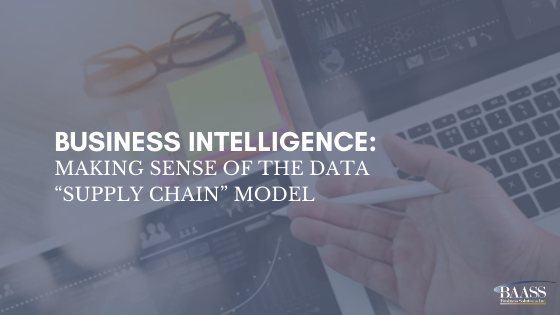
As you consider various business intelligence solutions for your company, consider one often overlooked aspect of BI: the “supply chain” of data feeding into your BI software.
Business intelligence thrives on a steady stream of data collected from systems and departments throughout your company. This uninterrupted ‘supply chain’ of data ensures that the inputs into the BI system provide fodder for reports, data visualizations, and the outputs required to build a comprehensive picture into your business’ operations. Managing that data supply chain is vital to the success of your BI program.
Data, Data, Everywhere: Where Is Your Data Coming From?
The first step to managing any supply chain is to identify the vendors providing the inputs. In the case of the data supply chain, the ‘vendors’ reflect departments in your organization that provides data inputs into the BI system. The more processes that are automated through your integrated ERP system (with an integrated database), the easier this step will be.
Ask the following questions:
- Which departments have data that we need to include in the system? Some common areas that produce valuable business data include accounting, finance, warehouse management, operations, manufacturing, distribution, marketing, and sales. The more processes that are automated through your integrated ERP system (with an integrated database), the easier this step will be. But don’t forget data that may be outside of your ERP.
- What data rules are in place for data governance? Data governance means how you manage your data. Quality guidelines ensure that data enters the system consistently and correctly. Clean data, or data that follow the data quality and governance guidelines, are trustworthy data. If you do not have data quality, governance and compliance guidelines in place, you may wish to discuss it with BAASS Business Solutions for assistance.
- Do we have legacy systems that need to integrate with a new BI system? Legacy systems may integrate easily or they may need custom coding to work seamlessly with your new system. In either case, knowing what you have to work with ahead of time makes it easier to plan an approach to the project. It also ensures that you have adequate time to find people to write custom coding and test it thoroughly before the launch of your new BI system.
The Role of the Data Champion
Your next step is to choose a ‘data champion’ from within each department that will feed data into the business intelligence system. A data champion is a person who is trained intensively in how to use the business intelligence system and who has management rights to the database. This person can make sure that data is inputted into the system according to the data governance rules established for your company, and helps to ensure that data adheres to all rules established.
A data champion typically attends more training sessions with the BI software vendor, learning in-depth about the system and its reporting features. Champions may be trained on how to create custom reports, how to update fields, and how to do custom programming. In the future when requests arise, data champions can then handle them in-house.
Lastly, data champions are the internal problems solvers and answer people for the new system. After the initial rollout of the BI system is complete and the initial training sessions are over, users tend to remember the features they use most frequently and forget those used infrequently. The data champion can answer questions and retrain users on the system features they may have forgotten.
Your Next Step: Choosing a Business Intelligence System
Choosing a business intelligence system is an important step forward. When it comes time to make that choice, consider working with BAASS Business Solutions.
At BAASS Business Solutions, we seek to help our customers improve processes to become more profitable. We take the time to understand the needs of your business and help you select software that will improve efficiencies, service, and profitability. For more information, please contact us.